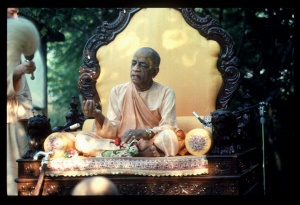SB 5.26.26: Difference between revisions
m (1 revision(s)) |
(Vanibot #0054 edit - transform synonyms into clickable links, which search similar occurrences) |
||
| (One intermediate revision by one other user not shown) | |||
| Line 1: | Line 1: | ||
{{info | {{info | ||
|speaker= | |speaker=Śukadeva Gosvāmī | ||
|listener=King | |listener=King Parīkṣit | ||
}} | }} | ||
[[Category:Srimad-Bhagavatam - Canto 05 Chapter 26]] | |||
[[Category:Bhagavatam Verses Spoken by Sukadeva Gosvami - Vanisource|052626]] | |||
<div style="float:left">'''[[Srimad-Bhagavatam]] - [[SB 5|Fifth Canto]] - [[SB 5.26: A Description of the Hellish Planets|Chapter 26: A Description of the Hellish Planets]]'''</div> | |||
<div style="float:right">[[File:Go-previous.png|link=SB 5.26.25]] '''[[SB 5.26.25]] - [[SB 5.26.27]]''' [[File:Go-next.png|link=SB 5.26.27]]</div> | |||
{{RandomImage}} | |||
==== TEXT 26 ==== | ==== TEXT 26 ==== | ||
<div | <div class="verse"> | ||
yas tv iha vai savarṇāṁ bhāryāṁ dvijo retaḥ pāyayati kāma-mohitas taṁ pāpa-kṛtam amutra retaḥ-kulyāyāṁ pātayitvā retaḥ sampāyayanti | :yas tv iha vai savarṇāṁ bhāryāṁ | ||
:dvijo retaḥ pāyayati kāma-mohitas taṁ | |||
:pāpa-kṛtam amutra retaḥ-kulyāyāṁ | |||
:pātayitvā retaḥ sampāyayanti | |||
</div> | </div> | ||
| Line 13: | Line 22: | ||
==== SYNONYMS ==== | ==== SYNONYMS ==== | ||
<div | <div class="synonyms"> | ||
''[//vanipedia.org/wiki/Special:VaniSearch?s=yaḥ&tab=syno_o&ds=1 yaḥ]'' — any person who; ''[//vanipedia.org/wiki/Special:VaniSearch?s=tu&tab=syno_o&ds=1 tu]'' — but; ''[//vanipedia.org/wiki/Special:VaniSearch?s=iha&tab=syno_o&ds=1 iha]'' — in this life; ''[//vanipedia.org/wiki/Special:VaniSearch?s=vai&tab=syno_o&ds=1 vai]'' — indeed; ''[//vanipedia.org/wiki/Special:VaniSearch?s=savarṇām&tab=syno_o&ds=1 savarṇām]'' — of the same caste; ''[//vanipedia.org/wiki/Special:VaniSearch?s=bhāryām&tab=syno_o&ds=1 bhāryām]'' — his wife; ''[//vanipedia.org/wiki/Special:VaniSearch?s=dvijaḥ&tab=syno_o&ds=1 dvijaḥ]'' — a person of a higher caste (such as a brāhmaṇa, kṣatriya or vaiśya); ''[//vanipedia.org/wiki/Special:VaniSearch?s=retaḥ&tab=syno_o&ds=1 retaḥ]'' — the semen; ''[//vanipedia.org/wiki/Special:VaniSearch?s=pāyayati&tab=syno_o&ds=1 pāyayati]'' — causes to drink; ''[//vanipedia.org/wiki/Special:VaniSearch?s=kāma&tab=syno_o&ds=1 kāma]-[//vanipedia.org/wiki/Special:VaniSearch?s=mohitaḥ&tab=syno_o&ds=1 mohitaḥ]'' — being deluded by lusty desires; ''[//vanipedia.org/wiki/Special:VaniSearch?s=tam&tab=syno_o&ds=1 tam]'' — him; ''[//vanipedia.org/wiki/Special:VaniSearch?s=pāpa&tab=syno_o&ds=1 pāpa]-[//vanipedia.org/wiki/Special:VaniSearch?s=kṛtam&tab=syno_o&ds=1 kṛtam]'' — performing sin; ''[//vanipedia.org/wiki/Special:VaniSearch?s=amutra&tab=syno_o&ds=1 amutra]'' — in the next life; ''[//vanipedia.org/wiki/Special:VaniSearch?s=retaḥ&tab=syno_o&ds=1 retaḥ]-[//vanipedia.org/wiki/Special:VaniSearch?s=kulyāyām&tab=syno_o&ds=1 kulyāyām]'' — in a river of semen; ''[//vanipedia.org/wiki/Special:VaniSearch?s=pātayitvā&tab=syno_o&ds=1 pātayitvā]'' — throwing; ''[//vanipedia.org/wiki/Special:VaniSearch?s=retaḥ&tab=syno_o&ds=1 retaḥ]'' — semen; ''[//vanipedia.org/wiki/Special:VaniSearch?s=sampāyayanti&tab=syno_o&ds=1 sampāyayanti]'' — force to drink. | |||
</div> | </div> | ||
| Line 20: | Line 29: | ||
==== TRANSLATION ==== | ==== TRANSLATION ==== | ||
<div | <div class="translation"> | ||
If a foolish member of the twice-born classes [brāhmaṇa, kṣatriya and vaiśya] forces his wife to drink his semen out of a lusty desire to keep her under control, he is put after death into the hell known as Lālābhakṣa. There he is thrown into a flowing river of semen, which he is forced to drink. | If a foolish member of the twice-born classes [brāhmaṇa, kṣatriya and vaiśya] forces his wife to drink his semen out of a lusty desire to keep her under control, he is put after death into the hell known as Lālābhakṣa. There he is thrown into a flowing river of semen, which he is forced to drink. | ||
</div> | </div> | ||
| Line 27: | Line 36: | ||
==== PURPORT ==== | ==== PURPORT ==== | ||
<div | <div class="purport"> | ||
The practice of forcing one's wife to drink one's own semen is a black art practiced by extremely lusty persons. Those who practice this very abominable activity say that if a wife is forced to drink her husband's semen, she remains very faithful to him. Generally only low-class men engage in this black art, but if a man born in a higher class does so, after death he is put into the hell known as Lālābhakṣa. There he is immersed in the river known as Śukra-nadī and forced to drink semen. | The practice of forcing one's wife to drink one's own semen is a black art practiced by extremely lusty persons. Those who practice this very abominable activity say that if a wife is forced to drink her husband's semen, she remains very faithful to him. Generally only low-class men engage in this black art, but if a man born in a higher class does so, after death he is put into the hell known as Lālābhakṣa. There he is immersed in the river known as Śukra-nadī and forced to drink semen. | ||
</div> | </div> | ||
__NOTOC__ | |||
<div style="float:right; clear:both;">[[File:Go-previous.png|link=SB 5.26.25]] '''[[SB 5.26.25]] - [[SB 5.26.27]]''' [[File:Go-next.png|link=SB 5.26.27]]</div> | |||
__NOTOC__ | |||
__NOEDITSECTION__ | |||
Latest revision as of 22:17, 18 February 2024

A.C. Bhaktivedanta Swami Prabhupada
TEXT 26
- yas tv iha vai savarṇāṁ bhāryāṁ
- dvijo retaḥ pāyayati kāma-mohitas taṁ
- pāpa-kṛtam amutra retaḥ-kulyāyāṁ
- pātayitvā retaḥ sampāyayanti
SYNONYMS
yaḥ — any person who; tu — but; iha — in this life; vai — indeed; savarṇām — of the same caste; bhāryām — his wife; dvijaḥ — a person of a higher caste (such as a brāhmaṇa, kṣatriya or vaiśya); retaḥ — the semen; pāyayati — causes to drink; kāma-mohitaḥ — being deluded by lusty desires; tam — him; pāpa-kṛtam — performing sin; amutra — in the next life; retaḥ-kulyāyām — in a river of semen; pātayitvā — throwing; retaḥ — semen; sampāyayanti — force to drink.
TRANSLATION
If a foolish member of the twice-born classes [brāhmaṇa, kṣatriya and vaiśya] forces his wife to drink his semen out of a lusty desire to keep her under control, he is put after death into the hell known as Lālābhakṣa. There he is thrown into a flowing river of semen, which he is forced to drink.
PURPORT
The practice of forcing one's wife to drink one's own semen is a black art practiced by extremely lusty persons. Those who practice this very abominable activity say that if a wife is forced to drink her husband's semen, she remains very faithful to him. Generally only low-class men engage in this black art, but if a man born in a higher class does so, after death he is put into the hell known as Lālābhakṣa. There he is immersed in the river known as Śukra-nadī and forced to drink semen.